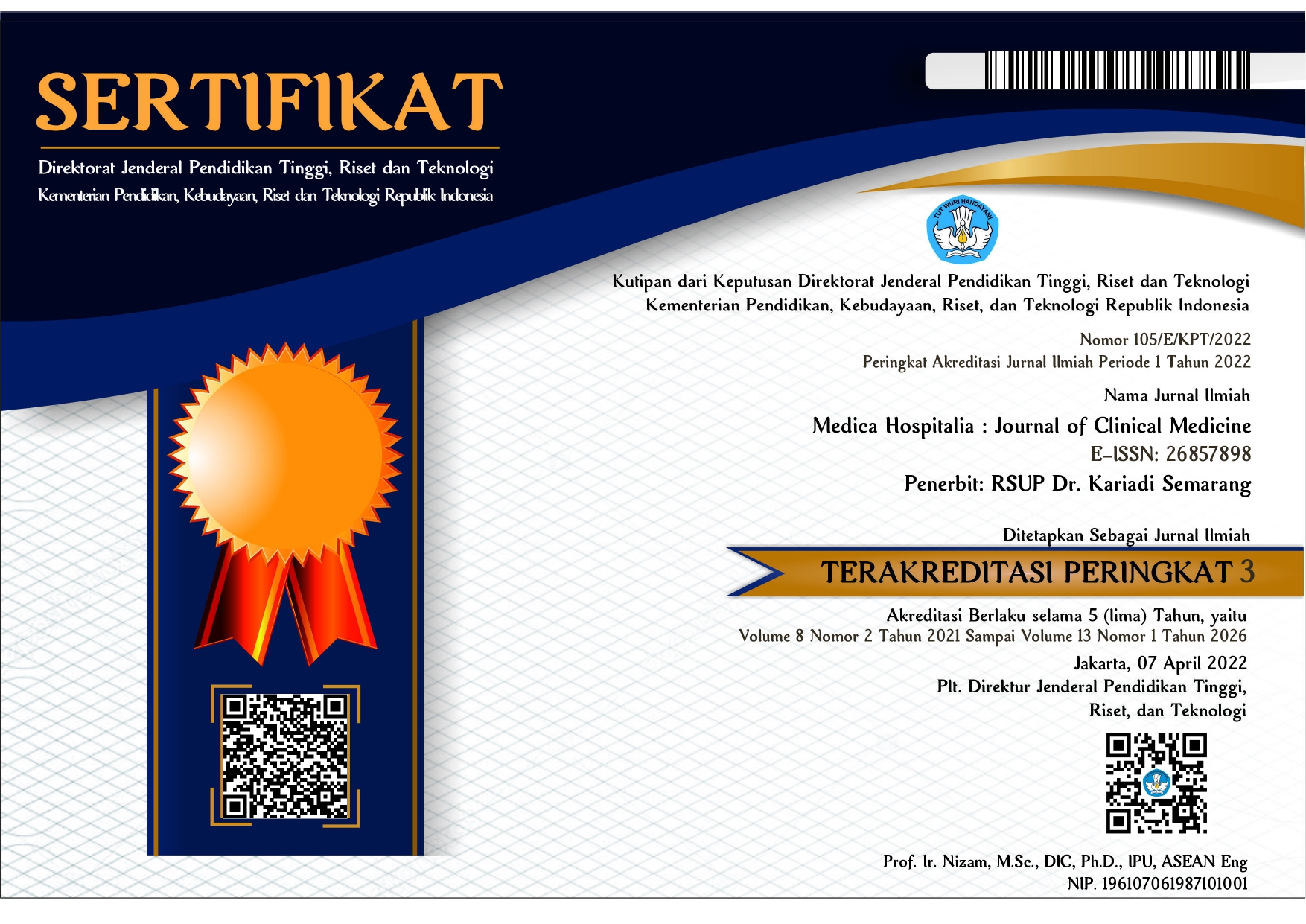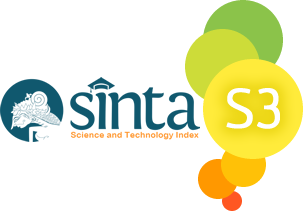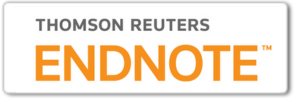Coping Strategies And Dass Scores Among Nurses On Duty In Covid-19 Isolation Room: A Cross-Sectional Study
DOI:
https://doi.org/10.36408/mhjcm.v10i2.875Keywords:
Coping strategies, DASS, Nurses, Covid-19, Mental HealthAbstract
BACKGROUNDS: Nurses are at risk for mental health problems while caring for Corona Virus Disease 2019 (COVID-19) patients. The COVID-19 pandemic had impacted not only on emotions but also nurses' coping strategies. The difference between this study and previous research in this study adds up the total DASS 42 (Depression Anxiety Stress Scale) scores as parameter to assess mental health problems of the subjects.
OBJECTIVE: To determine the association between coping strategies and the DASS score among nurses on duty in the COVID-19 isolation room of Dr Kariadi Hospital.
METHODS: This cross-sectional study involved nurses who treated patients in the COVID-19 isolation ward, the COVID-19 intensive room, and the COVID-19 emergency room. All participants were involved by the consecutive sampling method. The research instrument used a sociodemographic questionnaire, the Brief COPE, and the DASS 42. Inclusion criteria included nurses who served in the COVID-19 isolation room and aged 22-60 years. Higher DASS score indicates that the subject is experiencing general psychological distress compared to subjects with a lower score.
RESULTS: Most of the respondents in this study (n=112 subjects) had problem-focused coping strategies. The mean DASS score on the subjects is 14.29 ± 13.25. There was an association between coping strategies (p=0.048), sex (p < 0.001), place of work (p = 0.041), and DASS score.
CONCLUSION: There was a relationship between coping strategies and the DASS score of nurses on duty in the COVID-19-19 isolation room. Further research needs to explore environmental factors and social support, also examine physical illnesses in more detail.
Downloads
References
1. Zhang W-R, Wang K, Yin L, Zhao W-F, Xue Q, Peng M, et al. Mental Health and Psychosocial Problems of Medical Health Workers during the COVID-19 Epidemic in China. Psychother Psychosom. 2020/04/09. 2020;89(4):242–50.
2. Kementrian Kesehatan Republik Indonesia. Pedoman Dukungan Kesehatan Jiwa dan Psikososial pada Pandemi Covid-19 [Internet]. 2020 [cited 2021 Feb 12]. Available from: https://www.kemkes.go.id/article/view/20043000003/pedoman-dukungan-kesehatan-jiwa-dan-psikososial-pada-pandemi-covid-19.html
3. Kementrian Kesehatan Republik Indonesia. Infeksi Emerging [Internet]. 2021 [cited 2021 Feb 11]. Available from: https://infeksiemerging.kemkes.go.id/situasi-infeksi-emerging/situasi-terkini-perkembangan-coronavirus-disease-covid-19-11-februari-2021
4. Zhang Y, Wang C, Pan W, Zheng J, Gao J, Huang X, et al. Stress, Burnout, and Coping Strategies of Frontline Nurses During the COVID-19 Epidemic in Wuhan and Shanghai, China. Front psychiatry. 2020 Oct 26;11:565520.
5. Chesak SS, Cutshall SM, Bowe CL, Montanari KM, Bhagra A. Stress Management Interventions for Nurses: Critical Literature Review. J Holist Nurs Off J Am Holist Nurses’ Assoc. 2019 Sep;37(3):288–95.
6. Arnetz JE, Goetz CM, Arnetz BB, Arble E. Nurse Reports of Stressful Situations during the COVID-19 Pandemic: Qualitative Analysis of Survey Responses. Int J Environ Res Public Health. 2020;17(21):E8126.
7. Cui S, Jiang Y, Shi Q, Zhang L, Kong D, Qian M, et al. Impact of COVID-19 on anxiety, stress, and coping styles in nurses in emergency departments and fever Clinics: A cross-sectional survey. Risk Manag Healthc Policy. 2021;14:585.
8. Silwal M, Koirala D, Koirala S, Lamichhane A. Depression, anxiety and stress among nurses during corona lockdown in a selected teaching hospital, Kaski, Nepal. J Heal Allied Sci. 2020;10(2):82–7.
9. Hummel S, Oetjen N, Du J, Posenato E, Resende de Almeida RM, Losada R, et al. Mental health among medical professionals during the COVID-19 pandemic in eight European countries: cross-sectional survey study. J Med Internet Res. 2021;23(1):e24983.
10. Marthoenis, Maskur, Fathiariani L, Nassimbwa J. Investigating the burden of mental distress among nurses at a provincial COVID-19 referral hospital in Indonesia: a cross-sectional study. BMC Nurs. 2021;20(1):1–8.
11. Huang L, Lei W, Xu F, Liu H, Yu L. Emotional responses and coping strategies in nurses and nursing students during Covid-19 outbreak: A comparative study. PLoS One. 2020;15(8):e0237303.
12. Zyga S, Mitrousi S, Alikari V, Sachlas A, Stathoulis J, Fradelos E, et al. Assesing Factors that Affect Coping Strategies Among Nursing Personnel. Mater Sociomed. 2016/03/25. 2016 Apr;28(2):146–50.
13. Ali H, Astin Cole AA, Sa’d Hamasha GP. Major stressors and coping strategies of frontline nursing staff during the outbreak of coronavirus disease 2020 (COVID-19) in Alabama. J Multidiscip Healthc. 2020;13:2057.
14. Zheng R, Zhou Y, Qiu M, Yan Y, Yue J, Yu L, et al. Prevalence and associated factors of depression, anxiety, and stress among Hubei pediatric nurses during COVID-19 pandemic. Compr Psychiatry. 2021;104:152217.
15. Labrague LJ. Psychological resilience, coping behaviours and social support among health care workers during the COVID‐19 pandemic: A systematic review of quantitative studies. J Nurs Manag. 2021;
16. Si M-Y, Su X-Y, Jiang Y, Wang W-J, Gu X-F, Ma L, et al. Psychological impact of COVID-19 on medical care workers in China. Infect Dis poverty. 2020;9(1):1–13.
17. Ismail M, Lee KY, Sutrisno Tanjung A, Ahmad Jelani IA, Abdul Latiff R, Abdul Razak H, et al. The prevalence of psychological distress and its association with coping strategies among medical interns in Malaysia: A national-level cross-sectional study. Asia Pacific psychiatry. 2020 Aug;13(2):e12417.
18. Rahnama M, Shahdadi H, Bagheri S, Moghadam MP, Absalan A. The Relationship between Anxiety and Coping Strategies in Family Caregivers of Patients with Trauma. J Clin Diagn Res. 2017/04/01. 2017 Apr;11(4):IC06–9.
19. Alnazly E, Khraisat OM, Al-Bashaireh AM, Bryant CL. Anxiety, depression, stress, fear and social support during COVID-19 pandemic among Jordanian healthcare workers. PLoS One. 2021;16(3):e0247679.
20. Gao W, Ping S, Liu X. Gender differences in depression, anxiety, and stress among college students: A longitudinal study from China. J Affect Disord. 2020 Feb;263:292–300.
21. Cheung T, Yip PSF. Depression, Anxiety and Symptoms of Stress among Hong Kong Nurses: A Cross-sectional Study. Int J Environ Res Public Health. 2015 Sep 7;12(9):11072–100.
22. Muliantino MR, Huriani E, Krisdianto BF, Sarfika R, Yesni M, Sulistyowati E, et al. Psychological Responses Among Indonesian Nurses In The Outbreak Of Covid-19 Pandemic. J Nurs Care. 2021;4(2).
23. Chowdhury SR, Sunna TC, Das DC, Kabir H, Hossain A, Mahmud S, et al. Mental health symptoms among the nurses of Bangladesh during the COVID-19 pandemic. Middle East Curr Psychiatry, Ain Shams Univ. 2021/04/02. 2021;28(1):23.
24. Lestari I, Nursalam N, Nastiti AA. Analysis of factors affecting nurse anxiety during pandemic COVID-19. Psychiatry Nurs J. 2021;3(1):10–7.
Additional Files
Published
How to Cite
Issue
Section
Citation Check
License
Copyright (c) 2023 Septo Pero Adinoto, Alifiati Fitrikasari, Natalia Dewi Wardani, Elly Noerhidajati

This work is licensed under a Creative Commons Attribution-ShareAlike 4.0 International License.
Copyrights Notice
Copyrights:
Researchers publishing manuscrips at Medica Hospitalis: Journal of Clinical Medicine agree with regulations as follow:
Copyrights of each article belong to researchers, and it is likewise the patent rights
Researchers admit that Medica Hospitalia: Journal of Clinical Medicine has the right of first publication
Researchers may submit manuscripts separately, manage non exclusive distribution of published manuscripts into other versions (such as: being sent to researchers’ institutional repository, publication in the books, etc), admitting that manuscripts have been firstly published at Medica Hospitalia: Journal of Clinical Medicine
License:
Medica Hospitalia: Journal of Clinical Medicine is disseminated based on provisions of Creative Common Attribution-Share Alike 4.0 Internasional It allows individuals to duplicate and disseminate manuscripts in any formats, to alter, compose and make derivatives of manuscripts for any purpose. You are not allowed to use manuscripts for commercial purposes. You should properly acknowledge, reference links, and state that alterations have been made. You can do so in proper ways, but it does not hint that the licensors support you or your usage.

























